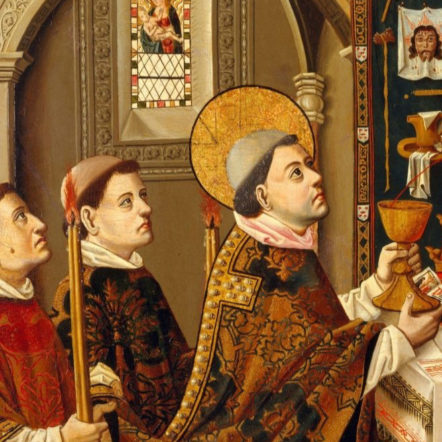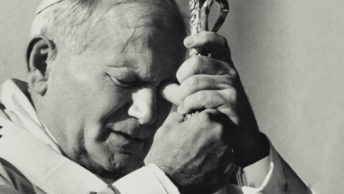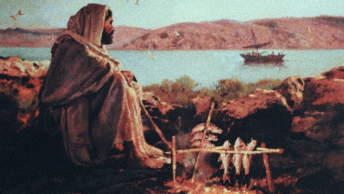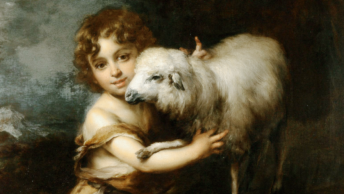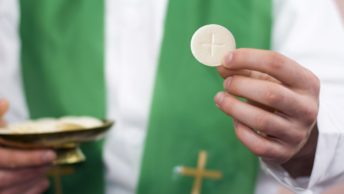Much of Spain, a traditionally Catholic land, had been conquered by Muslims, known as the Moors, in the 7th and 8th centuries; for hundreds of years Catholic rulers tried to drive them out—a process only completed in the 15th century under King Ferdinand and Queen Isabella. In the year 1239 a small Catholic kingdom in Spain was trying to withstand an attack from the Moors, whose army was vastly larger and more powerful. The Catholics, who were defending a small hill, prepared for battle by first attending Mass. Back then it was very uncommon for Catholics to receive Holy Communion—that’s why the Church had to institute a rule requiring every Catholic to do so at least once a year—and the intention was that at this Mass, only the priest and the six officers leading the army would do so. When the time for Communion arrived, the priest consumed his Host, but then a warning was shouted: the Moors were attacking. There was no time for the officers to receive, so as the soldiers ran to defend the hill, the priest wrapped the six Hosts in a corporal—the small white cloth placed on the altar—and hid them in a cave, so the Moors wouldn’t discover and desecrate them.
Miraculously, the Catholic soldiers—said by some accounts to be outnumbered by 100 – 1—held off the enemy with few losses. Afterwards, Mass resumed, but when the priest retrieved the corporal with the Hosts, he found they were stained with blood, and fused to the cloth—even to the point of the Sacred Blood penetrating the fibers of the linen. The entire Catholic army fell to its knees in adoration, praying so long that the Moors sensed another opportunity to attack. Because the Catholics were too absorbed in prayer to fight, Heaven itself defended them: the attackers were suddenly thrown into such a state of panic that they began killing each other, and when the priest held aloft the corporal with the Hosts, the splendid light which shone forth caused the remaining Moors to flee in fear. Afterwards, there was a dispute among the three local Catholic towns closest to the battlefield as to which one should be entrusted with the preservation of the miraculous Hosts, so it was decided to place the corporal and Hosts in a metal box and fasten it to the back of a small blind mule captured in battle, letting God direct the animal’s course.
Over the next two weeks, as the blind mule wandered through the countryside, followed by the victorious Catholic army, the sound of heavenly singing attracted many people from the countryside, all of whom joined the procession. Several miracles occurred: a possessed man was freed from a demonic spirit, which cried out in fear as the Eucharistic procession passed by. Out in the hills, a traveling merchant was about to be murdered by two robbers, but he had a vision of the procession coming that way, and his description of it so frightened the robbers that they fled, taking the merchant’s money with them. The merchant himself ran down to the procession, knelt in adoration, and described how his life had been miraculously spared. As the priest, soldiers, and people listened in wonder, the two robbers themselves came down, filled with genuine repentance. They told how they had been converted by the sound of celestial music as they were hiding in the hills; to show that their conversion was genuine, they returned the merchant’s money and made their confession. Then they went off to spend the rest of their lives in penance, followed by the merchant, after he had given away all his money and possessions to the poor. The mule finally arrived at the Spanish town of Daroca, which became the recipient of the corporal and miraculous Hosts (Janice Bennett, St. Laurence & the Holy Grail, chapter 11). This in effect was the first ever Eucharistic procession in Spain, and it not only turned Daroca into an important pilgrimage site, but helped lead to a great revival of Eucharistic devotion in Spain and eventually throughout Catholic Europe. We often underestimate or forget the miraculous nature of the Eucharist, but this is a wondrous Sacrament that we must never take for granted. Jesus literally gives us Himself in Holy Communion, and this amazing gift is supposed to make a real difference in our lives.
Our God does wonderful things for us—but He does seek our loving and faith-filled response. The Book of Exodus (24:3-8) describes how Moses led the people in making a covenant, or sacred agreement, with the Lord—though over the centuries, the people of Israel often failed to live up to their agreement. That’s why, as the Letter to the Hebrews (9:11-15) states, Jesus came to establish a new and perfect covenant—one in which He is not only the High Priest, but also the sacrificial Lamb Whose Blood brings about our salvation. The Gospel of Mark (14:12-16, 22-26) describes how, at the Last Supper, our Lord gave His own Body and Blood to His followers, under the appearance of bread and wine. Jesus knew He was about to die, and so His words and actions took on a special meaning and importance. This truth affects us today, because every time we attend Mass with faith, we are spiritually present at the Last Supper—and every time we receive Holy Communion in a state of grace, we share in the one, perfect sacrifice of Christ.
Besides the miracle of Daroca, there have been many Eucharistic miracles recorded in the Church’s history. Most Catholics haven’t personally witnessed one of them, but every practicing Catholic is invited to share in the same one bread and one cup: the same miracle instituted by Jesus at the Last Supper, made present at every Mass throughout the Church’s history, and still present at every Catholic liturgy throughout the world today. Only in Heaven will we fully be able to recognize and comprehend how our souls are nourished, strengthened, and transformed by the Eucharist. Just as our bodies cannot live without oxygen, so our souls cannot live without Jesus. We usually don’t think about breathing, but we know it’s essential. We usually don’t think enough about the Eucharist and what it means to us, but as long as we’re open to the graces of the Sacrament, we are being spiritually renewed within and being made ready for eternal life in Christ’s presence. Even if we don’t witness any spectacular miracles, such as the rout of an enemy army, the deliverance of a possessed man, or the sudden conversion of hardened sinners, one of the most personal and important Eucharistic miracles can be taking place in our own hearts each day: the conversion of weak, sinful people like us into future saints, destined for an eternity of joyful and glorious life in Christ.

